Comprehensive Report on Post-Operative Care After Colostomy Surgery
VerifiedAdded on 2022/07/28
|9
|2805
|14
Report
AI Summary
This report provides a comprehensive analysis of post-operative care for patients who have undergone colostomy surgery. It explores the various impacts of the surgery, including biopsychosocial, cultural, and social challenges, such as psychological effects like low self-esteem, depression, and anxiety, and the impact on mobility and social interaction. The report examines the patient's history, including chronic conditions like diabetes, heart failure, and gout, and their influence on post-operative care. It details essential nursing interventions, such as dietary management, wound evaluation, and stoma care, including strategies for preventing infections and allergic reactions. The report also covers medication management, including the use of analgesics to manage pain and proton pump inhibitors to reduce gastric acid secretion. Finally, it emphasizes the importance of providing clear instructions to caregivers to ensure effective long-term patient care and improved self-esteem.
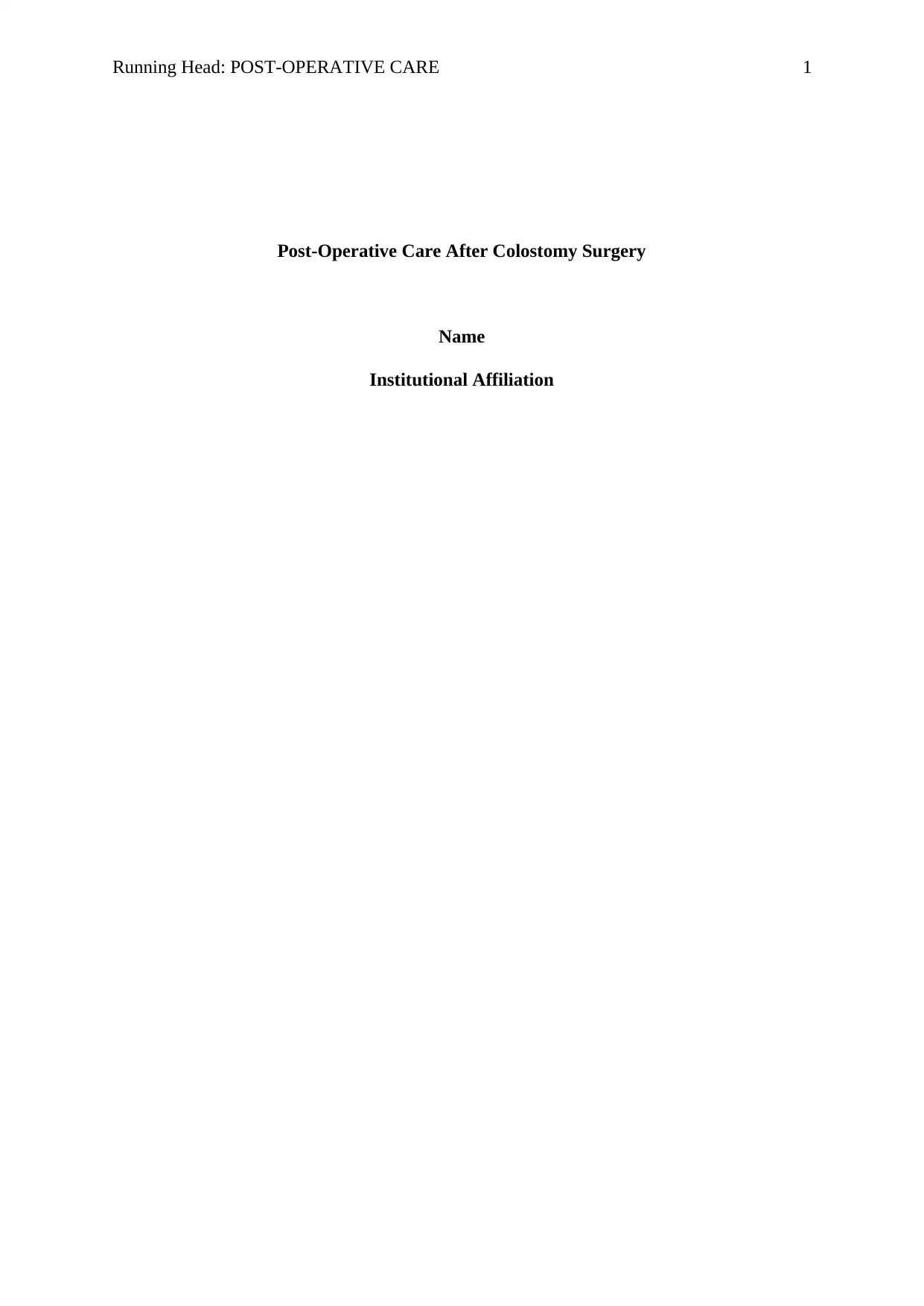
Running Head: POST-OPERATIVE CARE 1
Post-Operative Care After Colostomy Surgery
Name
Institutional Affiliation
Post-Operative Care After Colostomy Surgery
Name
Institutional Affiliation
Paraphrase This Document
Need a fresh take? Get an instant paraphrase of this document with our AI Paraphraser
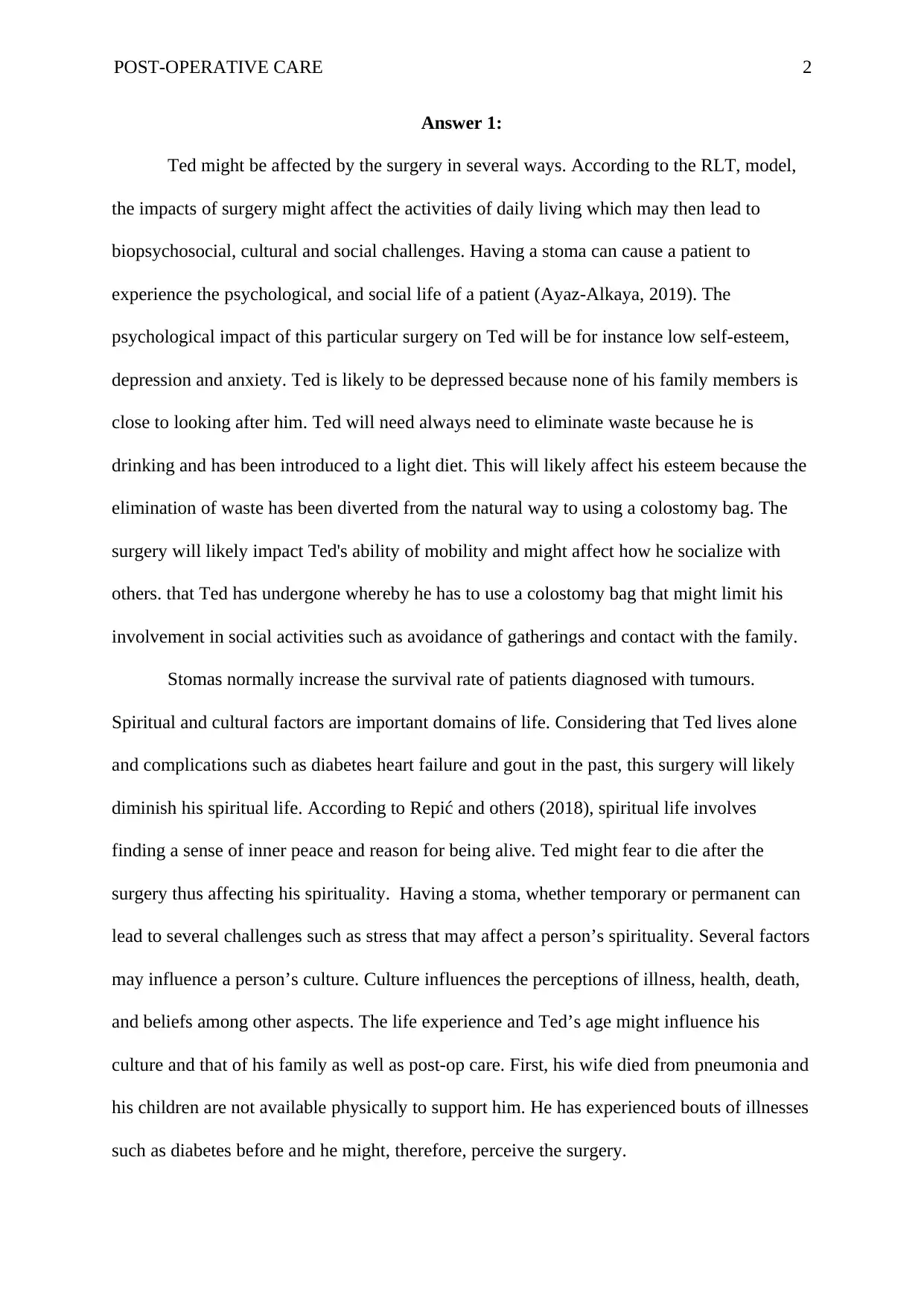
POST-OPERATIVE CARE 2
Answer 1:
Ted might be affected by the surgery in several ways. According to the RLT, model,
the impacts of surgery might affect the activities of daily living which may then lead to
biopsychosocial, cultural and social challenges. Having a stoma can cause a patient to
experience the psychological, and social life of a patient (Ayaz‐Alkaya, 2019). The
psychological impact of this particular surgery on Ted will be for instance low self-esteem,
depression and anxiety. Ted is likely to be depressed because none of his family members is
close to looking after him. Ted will need always need to eliminate waste because he is
drinking and has been introduced to a light diet. This will likely affect his esteem because the
elimination of waste has been diverted from the natural way to using a colostomy bag. The
surgery will likely impact Ted's ability of mobility and might affect how he socialize with
others. that Ted has undergone whereby he has to use a colostomy bag that might limit his
involvement in social activities such as avoidance of gatherings and contact with the family.
Stomas normally increase the survival rate of patients diagnosed with tumours.
Spiritual and cultural factors are important domains of life. Considering that Ted lives alone
and complications such as diabetes heart failure and gout in the past, this surgery will likely
diminish his spiritual life. According to Repić and others (2018), spiritual life involves
finding a sense of inner peace and reason for being alive. Ted might fear to die after the
surgery thus affecting his spirituality. Having a stoma, whether temporary or permanent can
lead to several challenges such as stress that may affect a person’s spirituality. Several factors
may influence a person’s culture. Culture influences the perceptions of illness, health, death,
and beliefs among other aspects. The life experience and Ted’s age might influence his
culture and that of his family as well as post-op care. First, his wife died from pneumonia and
his children are not available physically to support him. He has experienced bouts of illnesses
such as diabetes before and he might, therefore, perceive the surgery.
Answer 1:
Ted might be affected by the surgery in several ways. According to the RLT, model,
the impacts of surgery might affect the activities of daily living which may then lead to
biopsychosocial, cultural and social challenges. Having a stoma can cause a patient to
experience the psychological, and social life of a patient (Ayaz‐Alkaya, 2019). The
psychological impact of this particular surgery on Ted will be for instance low self-esteem,
depression and anxiety. Ted is likely to be depressed because none of his family members is
close to looking after him. Ted will need always need to eliminate waste because he is
drinking and has been introduced to a light diet. This will likely affect his esteem because the
elimination of waste has been diverted from the natural way to using a colostomy bag. The
surgery will likely impact Ted's ability of mobility and might affect how he socialize with
others. that Ted has undergone whereby he has to use a colostomy bag that might limit his
involvement in social activities such as avoidance of gatherings and contact with the family.
Stomas normally increase the survival rate of patients diagnosed with tumours.
Spiritual and cultural factors are important domains of life. Considering that Ted lives alone
and complications such as diabetes heart failure and gout in the past, this surgery will likely
diminish his spiritual life. According to Repić and others (2018), spiritual life involves
finding a sense of inner peace and reason for being alive. Ted might fear to die after the
surgery thus affecting his spirituality. Having a stoma, whether temporary or permanent can
lead to several challenges such as stress that may affect a person’s spirituality. Several factors
may influence a person’s culture. Culture influences the perceptions of illness, health, death,
and beliefs among other aspects. The life experience and Ted’s age might influence his
culture and that of his family as well as post-op care. First, his wife died from pneumonia and
his children are not available physically to support him. He has experienced bouts of illnesses
such as diabetes before and he might, therefore, perceive the surgery.
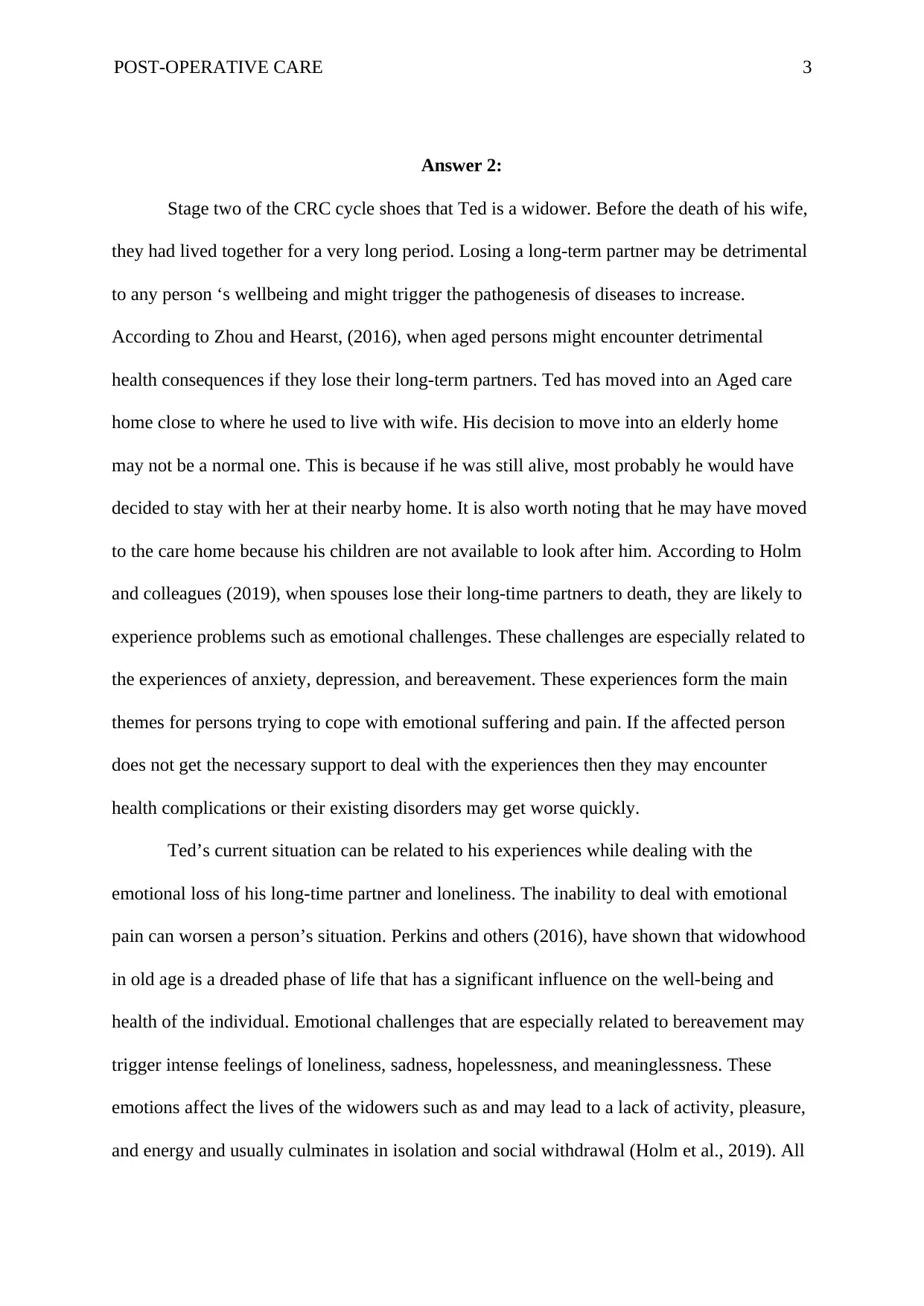
POST-OPERATIVE CARE 3
Answer 2:
Stage two of the CRC cycle shoes that Ted is a widower. Before the death of his wife,
they had lived together for a very long period. Losing a long-term partner may be detrimental
to any person ‘s wellbeing and might trigger the pathogenesis of diseases to increase.
According to Zhou and Hearst, (2016), when aged persons might encounter detrimental
health consequences if they lose their long-term partners. Ted has moved into an Aged care
home close to where he used to live with wife. His decision to move into an elderly home
may not be a normal one. This is because if he was still alive, most probably he would have
decided to stay with her at their nearby home. It is also worth noting that he may have moved
to the care home because his children are not available to look after him. According to Holm
and colleagues (2019), when spouses lose their long-time partners to death, they are likely to
experience problems such as emotional challenges. These challenges are especially related to
the experiences of anxiety, depression, and bereavement. These experiences form the main
themes for persons trying to cope with emotional suffering and pain. If the affected person
does not get the necessary support to deal with the experiences then they may encounter
health complications or their existing disorders may get worse quickly.
Ted’s current situation can be related to his experiences while dealing with the
emotional loss of his long-time partner and loneliness. The inability to deal with emotional
pain can worsen a person’s situation. Perkins and others (2016), have shown that widowhood
in old age is a dreaded phase of life that has a significant influence on the well-being and
health of the individual. Emotional challenges that are especially related to bereavement may
trigger intense feelings of loneliness, sadness, hopelessness, and meaninglessness. These
emotions affect the lives of the widowers such as and may lead to a lack of activity, pleasure,
and energy and usually culminates in isolation and social withdrawal (Holm et al., 2019). All
Answer 2:
Stage two of the CRC cycle shoes that Ted is a widower. Before the death of his wife,
they had lived together for a very long period. Losing a long-term partner may be detrimental
to any person ‘s wellbeing and might trigger the pathogenesis of diseases to increase.
According to Zhou and Hearst, (2016), when aged persons might encounter detrimental
health consequences if they lose their long-term partners. Ted has moved into an Aged care
home close to where he used to live with wife. His decision to move into an elderly home
may not be a normal one. This is because if he was still alive, most probably he would have
decided to stay with her at their nearby home. It is also worth noting that he may have moved
to the care home because his children are not available to look after him. According to Holm
and colleagues (2019), when spouses lose their long-time partners to death, they are likely to
experience problems such as emotional challenges. These challenges are especially related to
the experiences of anxiety, depression, and bereavement. These experiences form the main
themes for persons trying to cope with emotional suffering and pain. If the affected person
does not get the necessary support to deal with the experiences then they may encounter
health complications or their existing disorders may get worse quickly.
Ted’s current situation can be related to his experiences while dealing with the
emotional loss of his long-time partner and loneliness. The inability to deal with emotional
pain can worsen a person’s situation. Perkins and others (2016), have shown that widowhood
in old age is a dreaded phase of life that has a significant influence on the well-being and
health of the individual. Emotional challenges that are especially related to bereavement may
trigger intense feelings of loneliness, sadness, hopelessness, and meaninglessness. These
emotions affect the lives of the widowers such as and may lead to a lack of activity, pleasure,
and energy and usually culminates in isolation and social withdrawal (Holm et al., 2019). All
⊘ This is a preview!⊘
Do you want full access?
Subscribe today to unlock all pages.

Trusted by 1+ million students worldwide
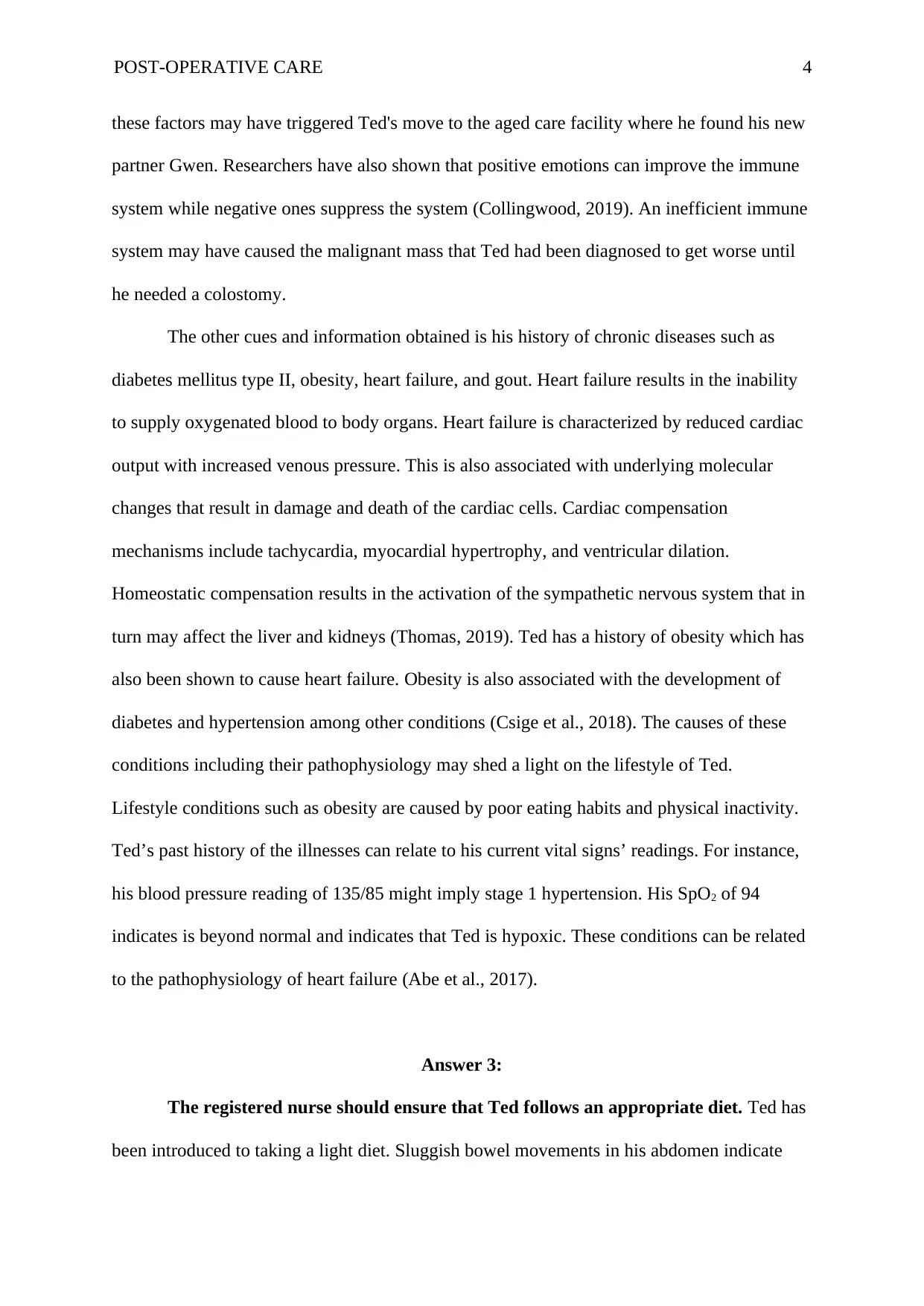
POST-OPERATIVE CARE 4
these factors may have triggered Ted's move to the aged care facility where he found his new
partner Gwen. Researchers have also shown that positive emotions can improve the immune
system while negative ones suppress the system (Collingwood, 2019). An inefficient immune
system may have caused the malignant mass that Ted had been diagnosed to get worse until
he needed a colostomy.
The other cues and information obtained is his history of chronic diseases such as
diabetes mellitus type II, obesity, heart failure, and gout. Heart failure results in the inability
to supply oxygenated blood to body organs. Heart failure is characterized by reduced cardiac
output with increased venous pressure. This is also associated with underlying molecular
changes that result in damage and death of the cardiac cells. Cardiac compensation
mechanisms include tachycardia, myocardial hypertrophy, and ventricular dilation.
Homeostatic compensation results in the activation of the sympathetic nervous system that in
turn may affect the liver and kidneys (Thomas, 2019). Ted has a history of obesity which has
also been shown to cause heart failure. Obesity is also associated with the development of
diabetes and hypertension among other conditions (Csige et al., 2018). The causes of these
conditions including their pathophysiology may shed a light on the lifestyle of Ted.
Lifestyle conditions such as obesity are caused by poor eating habits and physical inactivity.
Ted’s past history of the illnesses can relate to his current vital signs’ readings. For instance,
his blood pressure reading of 135/85 might imply stage 1 hypertension. His SpO2 of 94
indicates is beyond normal and indicates that Ted is hypoxic. These conditions can be related
to the pathophysiology of heart failure (Abe et al., 2017).
Answer 3:
The registered nurse should ensure that Ted follows an appropriate diet. Ted has
been introduced to taking a light diet. Sluggish bowel movements in his abdomen indicate
these factors may have triggered Ted's move to the aged care facility where he found his new
partner Gwen. Researchers have also shown that positive emotions can improve the immune
system while negative ones suppress the system (Collingwood, 2019). An inefficient immune
system may have caused the malignant mass that Ted had been diagnosed to get worse until
he needed a colostomy.
The other cues and information obtained is his history of chronic diseases such as
diabetes mellitus type II, obesity, heart failure, and gout. Heart failure results in the inability
to supply oxygenated blood to body organs. Heart failure is characterized by reduced cardiac
output with increased venous pressure. This is also associated with underlying molecular
changes that result in damage and death of the cardiac cells. Cardiac compensation
mechanisms include tachycardia, myocardial hypertrophy, and ventricular dilation.
Homeostatic compensation results in the activation of the sympathetic nervous system that in
turn may affect the liver and kidneys (Thomas, 2019). Ted has a history of obesity which has
also been shown to cause heart failure. Obesity is also associated with the development of
diabetes and hypertension among other conditions (Csige et al., 2018). The causes of these
conditions including their pathophysiology may shed a light on the lifestyle of Ted.
Lifestyle conditions such as obesity are caused by poor eating habits and physical inactivity.
Ted’s past history of the illnesses can relate to his current vital signs’ readings. For instance,
his blood pressure reading of 135/85 might imply stage 1 hypertension. His SpO2 of 94
indicates is beyond normal and indicates that Ted is hypoxic. These conditions can be related
to the pathophysiology of heart failure (Abe et al., 2017).
Answer 3:
The registered nurse should ensure that Ted follows an appropriate diet. Ted has
been introduced to taking a light diet. Sluggish bowel movements in his abdomen indicate
Paraphrase This Document
Need a fresh take? Get an instant paraphrase of this document with our AI Paraphraser
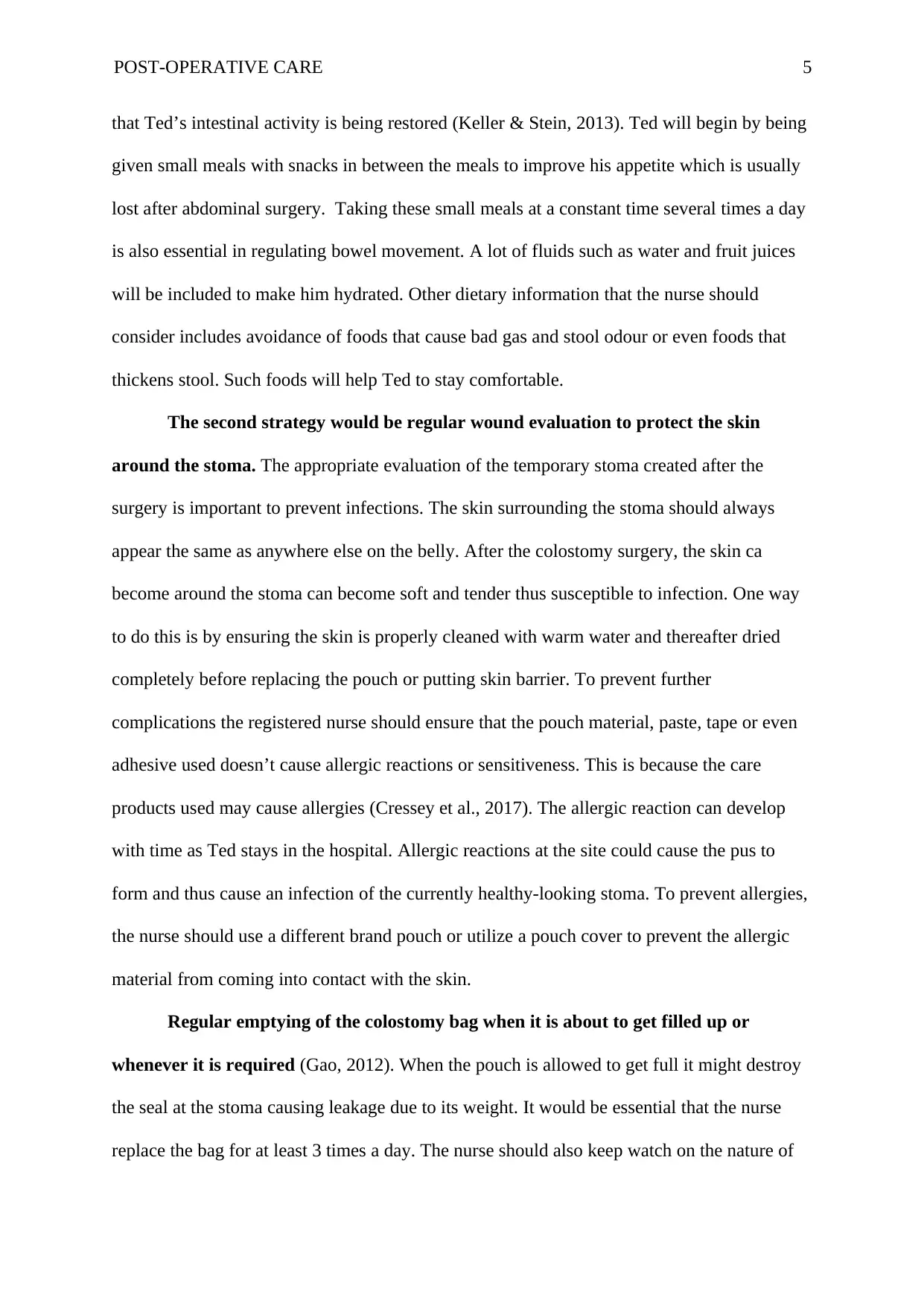
POST-OPERATIVE CARE 5
that Ted’s intestinal activity is being restored (Keller & Stein, 2013). Ted will begin by being
given small meals with snacks in between the meals to improve his appetite which is usually
lost after abdominal surgery. Taking these small meals at a constant time several times a day
is also essential in regulating bowel movement. A lot of fluids such as water and fruit juices
will be included to make him hydrated. Other dietary information that the nurse should
consider includes avoidance of foods that cause bad gas and stool odour or even foods that
thickens stool. Such foods will help Ted to stay comfortable.
The second strategy would be regular wound evaluation to protect the skin
around the stoma. The appropriate evaluation of the temporary stoma created after the
surgery is important to prevent infections. The skin surrounding the stoma should always
appear the same as anywhere else on the belly. After the colostomy surgery, the skin ca
become around the stoma can become soft and tender thus susceptible to infection. One way
to do this is by ensuring the skin is properly cleaned with warm water and thereafter dried
completely before replacing the pouch or putting skin barrier. To prevent further
complications the registered nurse should ensure that the pouch material, paste, tape or even
adhesive used doesn’t cause allergic reactions or sensitiveness. This is because the care
products used may cause allergies (Cressey et al., 2017). The allergic reaction can develop
with time as Ted stays in the hospital. Allergic reactions at the site could cause the pus to
form and thus cause an infection of the currently healthy-looking stoma. To prevent allergies,
the nurse should use a different brand pouch or utilize a pouch cover to prevent the allergic
material from coming into contact with the skin.
Regular emptying of the colostomy bag when it is about to get filled up or
whenever it is required (Gao, 2012). When the pouch is allowed to get full it might destroy
the seal at the stoma causing leakage due to its weight. It would be essential that the nurse
replace the bag for at least 3 times a day. The nurse should also keep watch on the nature of
that Ted’s intestinal activity is being restored (Keller & Stein, 2013). Ted will begin by being
given small meals with snacks in between the meals to improve his appetite which is usually
lost after abdominal surgery. Taking these small meals at a constant time several times a day
is also essential in regulating bowel movement. A lot of fluids such as water and fruit juices
will be included to make him hydrated. Other dietary information that the nurse should
consider includes avoidance of foods that cause bad gas and stool odour or even foods that
thickens stool. Such foods will help Ted to stay comfortable.
The second strategy would be regular wound evaluation to protect the skin
around the stoma. The appropriate evaluation of the temporary stoma created after the
surgery is important to prevent infections. The skin surrounding the stoma should always
appear the same as anywhere else on the belly. After the colostomy surgery, the skin ca
become around the stoma can become soft and tender thus susceptible to infection. One way
to do this is by ensuring the skin is properly cleaned with warm water and thereafter dried
completely before replacing the pouch or putting skin barrier. To prevent further
complications the registered nurse should ensure that the pouch material, paste, tape or even
adhesive used doesn’t cause allergic reactions or sensitiveness. This is because the care
products used may cause allergies (Cressey et al., 2017). The allergic reaction can develop
with time as Ted stays in the hospital. Allergic reactions at the site could cause the pus to
form and thus cause an infection of the currently healthy-looking stoma. To prevent allergies,
the nurse should use a different brand pouch or utilize a pouch cover to prevent the allergic
material from coming into contact with the skin.
Regular emptying of the colostomy bag when it is about to get filled up or
whenever it is required (Gao, 2012). When the pouch is allowed to get full it might destroy
the seal at the stoma causing leakage due to its weight. It would be essential that the nurse
replace the bag for at least 3 times a day. The nurse should also keep watch on the nature of
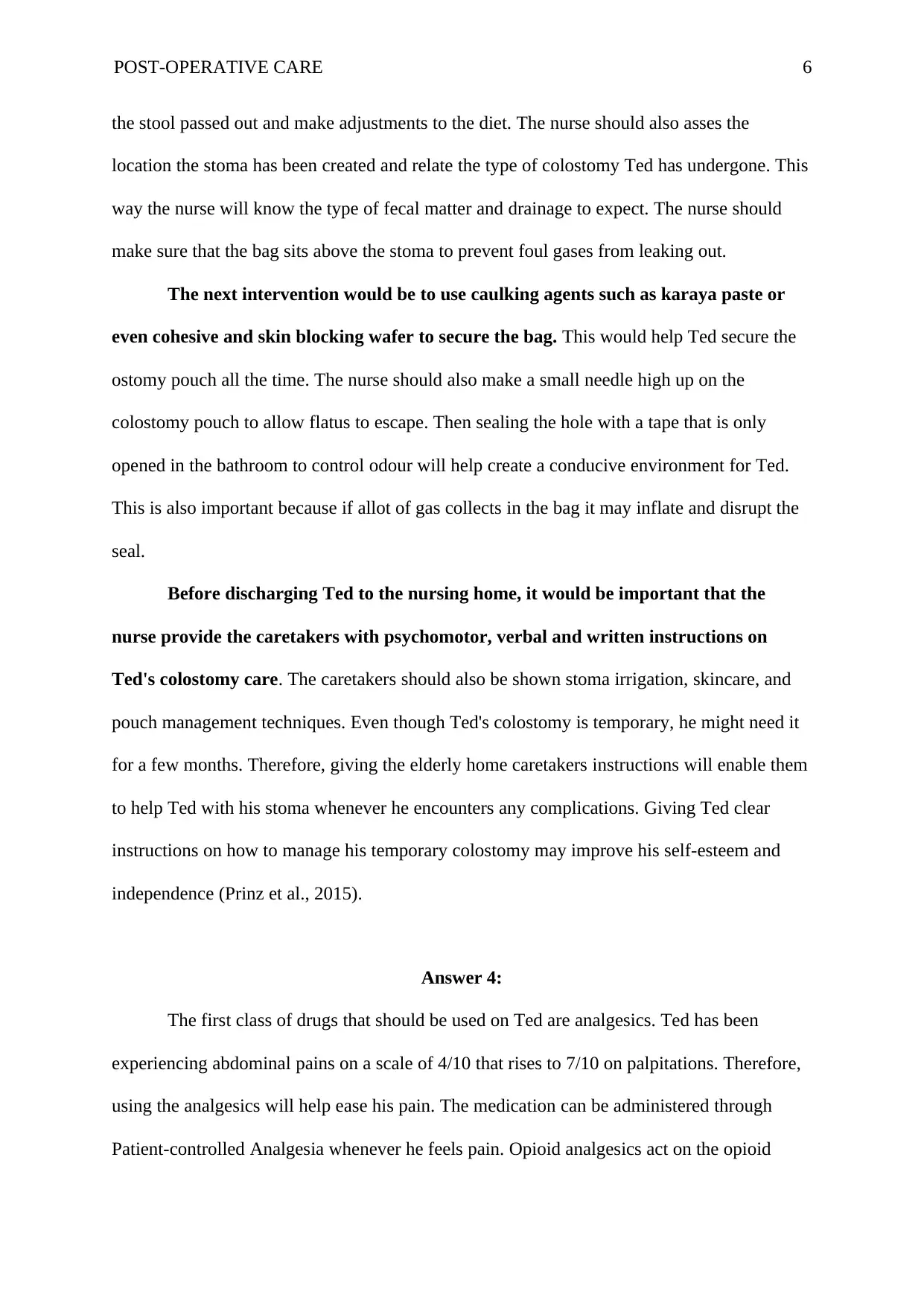
POST-OPERATIVE CARE 6
the stool passed out and make adjustments to the diet. The nurse should also asses the
location the stoma has been created and relate the type of colostomy Ted has undergone. This
way the nurse will know the type of fecal matter and drainage to expect. The nurse should
make sure that the bag sits above the stoma to prevent foul gases from leaking out.
The next intervention would be to use caulking agents such as karaya paste or
even cohesive and skin blocking wafer to secure the bag. This would help Ted secure the
ostomy pouch all the time. The nurse should also make a small needle high up on the
colostomy pouch to allow flatus to escape. Then sealing the hole with a tape that is only
opened in the bathroom to control odour will help create a conducive environment for Ted.
This is also important because if allot of gas collects in the bag it may inflate and disrupt the
seal.
Before discharging Ted to the nursing home, it would be important that the
nurse provide the caretakers with psychomotor, verbal and written instructions on
Ted's colostomy care. The caretakers should also be shown stoma irrigation, skincare, and
pouch management techniques. Even though Ted's colostomy is temporary, he might need it
for a few months. Therefore, giving the elderly home caretakers instructions will enable them
to help Ted with his stoma whenever he encounters any complications. Giving Ted clear
instructions on how to manage his temporary colostomy may improve his self-esteem and
independence (Prinz et al., 2015).
Answer 4:
The first class of drugs that should be used on Ted are analgesics. Ted has been
experiencing abdominal pains on a scale of 4/10 that rises to 7/10 on palpitations. Therefore,
using the analgesics will help ease his pain. The medication can be administered through
Patient-controlled Analgesia whenever he feels pain. Opioid analgesics act on the opioid
the stool passed out and make adjustments to the diet. The nurse should also asses the
location the stoma has been created and relate the type of colostomy Ted has undergone. This
way the nurse will know the type of fecal matter and drainage to expect. The nurse should
make sure that the bag sits above the stoma to prevent foul gases from leaking out.
The next intervention would be to use caulking agents such as karaya paste or
even cohesive and skin blocking wafer to secure the bag. This would help Ted secure the
ostomy pouch all the time. The nurse should also make a small needle high up on the
colostomy pouch to allow flatus to escape. Then sealing the hole with a tape that is only
opened in the bathroom to control odour will help create a conducive environment for Ted.
This is also important because if allot of gas collects in the bag it may inflate and disrupt the
seal.
Before discharging Ted to the nursing home, it would be important that the
nurse provide the caretakers with psychomotor, verbal and written instructions on
Ted's colostomy care. The caretakers should also be shown stoma irrigation, skincare, and
pouch management techniques. Even though Ted's colostomy is temporary, he might need it
for a few months. Therefore, giving the elderly home caretakers instructions will enable them
to help Ted with his stoma whenever he encounters any complications. Giving Ted clear
instructions on how to manage his temporary colostomy may improve his self-esteem and
independence (Prinz et al., 2015).
Answer 4:
The first class of drugs that should be used on Ted are analgesics. Ted has been
experiencing abdominal pains on a scale of 4/10 that rises to 7/10 on palpitations. Therefore,
using the analgesics will help ease his pain. The medication can be administered through
Patient-controlled Analgesia whenever he feels pain. Opioid analgesics act on the opioid
⊘ This is a preview!⊘
Do you want full access?
Subscribe today to unlock all pages.

Trusted by 1+ million students worldwide
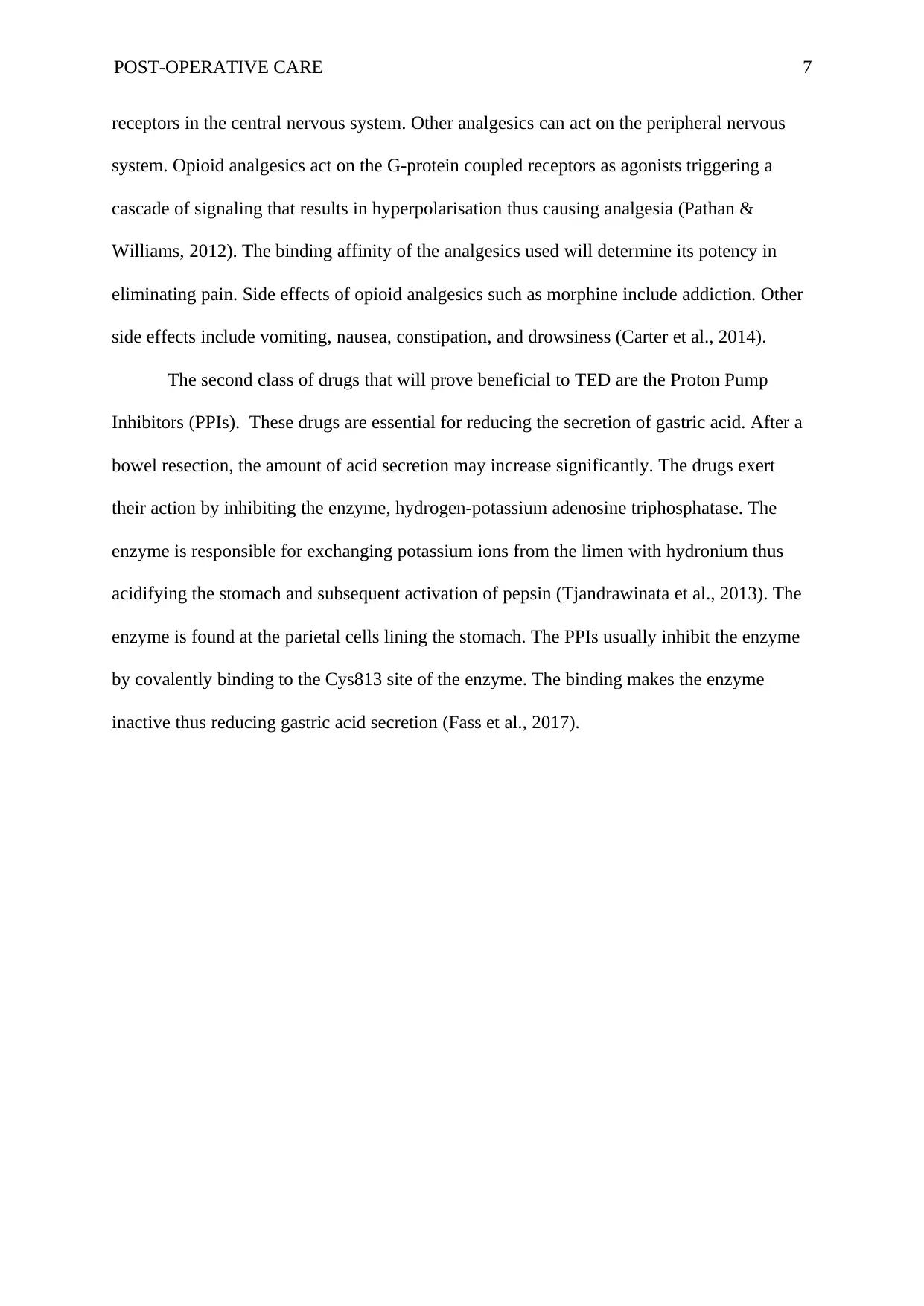
POST-OPERATIVE CARE 7
receptors in the central nervous system. Other analgesics can act on the peripheral nervous
system. Opioid analgesics act on the G-protein coupled receptors as agonists triggering a
cascade of signaling that results in hyperpolarisation thus causing analgesia (Pathan &
Williams, 2012). The binding affinity of the analgesics used will determine its potency in
eliminating pain. Side effects of opioid analgesics such as morphine include addiction. Other
side effects include vomiting, nausea, constipation, and drowsiness (Carter et al., 2014).
The second class of drugs that will prove beneficial to TED are the Proton Pump
Inhibitors (PPIs). These drugs are essential for reducing the secretion of gastric acid. After a
bowel resection, the amount of acid secretion may increase significantly. The drugs exert
their action by inhibiting the enzyme, hydrogen-potassium adenosine triphosphatase. The
enzyme is responsible for exchanging potassium ions from the limen with hydronium thus
acidifying the stomach and subsequent activation of pepsin (Tjandrawinata et al., 2013). The
enzyme is found at the parietal cells lining the stomach. The PPIs usually inhibit the enzyme
by covalently binding to the Cys813 site of the enzyme. The binding makes the enzyme
inactive thus reducing gastric acid secretion (Fass et al., 2017).
receptors in the central nervous system. Other analgesics can act on the peripheral nervous
system. Opioid analgesics act on the G-protein coupled receptors as agonists triggering a
cascade of signaling that results in hyperpolarisation thus causing analgesia (Pathan &
Williams, 2012). The binding affinity of the analgesics used will determine its potency in
eliminating pain. Side effects of opioid analgesics such as morphine include addiction. Other
side effects include vomiting, nausea, constipation, and drowsiness (Carter et al., 2014).
The second class of drugs that will prove beneficial to TED are the Proton Pump
Inhibitors (PPIs). These drugs are essential for reducing the secretion of gastric acid. After a
bowel resection, the amount of acid secretion may increase significantly. The drugs exert
their action by inhibiting the enzyme, hydrogen-potassium adenosine triphosphatase. The
enzyme is responsible for exchanging potassium ions from the limen with hydronium thus
acidifying the stomach and subsequent activation of pepsin (Tjandrawinata et al., 2013). The
enzyme is found at the parietal cells lining the stomach. The PPIs usually inhibit the enzyme
by covalently binding to the Cys813 site of the enzyme. The binding makes the enzyme
inactive thus reducing gastric acid secretion (Fass et al., 2017).
Paraphrase This Document
Need a fresh take? Get an instant paraphrase of this document with our AI Paraphraser
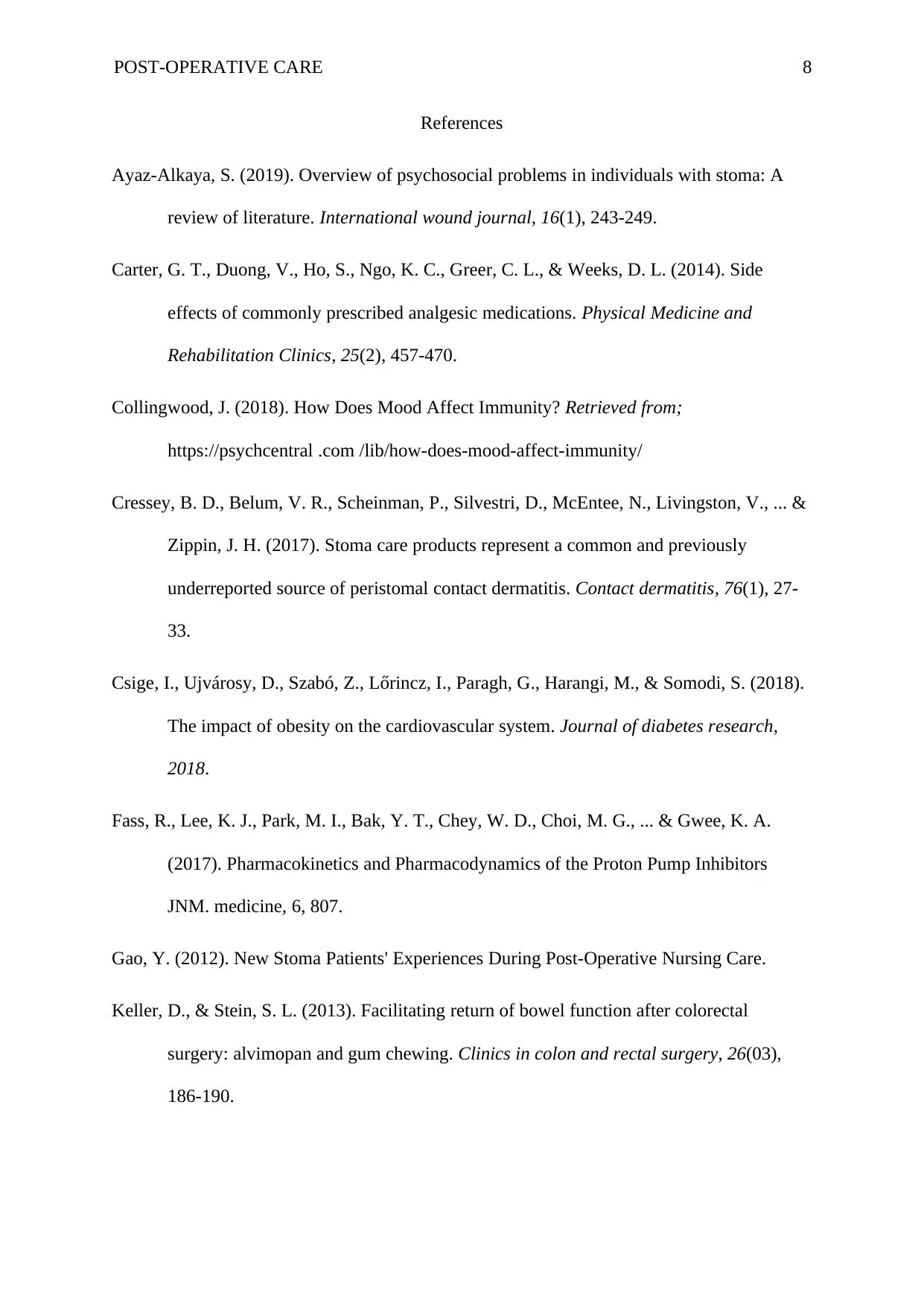
POST-OPERATIVE CARE 8
References
Ayaz‐Alkaya, S. (2019). Overview of psychosocial problems in individuals with stoma: A
review of literature. International wound journal, 16(1), 243-249.
Carter, G. T., Duong, V., Ho, S., Ngo, K. C., Greer, C. L., & Weeks, D. L. (2014). Side
effects of commonly prescribed analgesic medications. Physical Medicine and
Rehabilitation Clinics, 25(2), 457-470.
Collingwood, J. (2018). How Does Mood Affect Immunity? Retrieved from;
https://psychcentral .com /lib/how-does-mood-affect-immunity/
Cressey, B. D., Belum, V. R., Scheinman, P., Silvestri, D., McEntee, N., Livingston, V., ... &
Zippin, J. H. (2017). Stoma care products represent a common and previously
underreported source of peristomal contact dermatitis. Contact dermatitis, 76(1), 27-
33.
Csige, I., Ujvárosy, D., Szabó, Z., Lőrincz, I., Paragh, G., Harangi, M., & Somodi, S. (2018).
The impact of obesity on the cardiovascular system. Journal of diabetes research,
2018.
Fass, R., Lee, K. J., Park, M. I., Bak, Y. T., Chey, W. D., Choi, M. G., ... & Gwee, K. A.
(2017). Pharmacokinetics and Pharmacodynamics of the Proton Pump Inhibitors
JNM. medicine, 6, 807.
Gao, Y. (2012). New Stoma Patients' Experiences During Post-Operative Nursing Care.
Keller, D., & Stein, S. L. (2013). Facilitating return of bowel function after colorectal
surgery: alvimopan and gum chewing. Clinics in colon and rectal surgery, 26(03),
186-190.
References
Ayaz‐Alkaya, S. (2019). Overview of psychosocial problems in individuals with stoma: A
review of literature. International wound journal, 16(1), 243-249.
Carter, G. T., Duong, V., Ho, S., Ngo, K. C., Greer, C. L., & Weeks, D. L. (2014). Side
effects of commonly prescribed analgesic medications. Physical Medicine and
Rehabilitation Clinics, 25(2), 457-470.
Collingwood, J. (2018). How Does Mood Affect Immunity? Retrieved from;
https://psychcentral .com /lib/how-does-mood-affect-immunity/
Cressey, B. D., Belum, V. R., Scheinman, P., Silvestri, D., McEntee, N., Livingston, V., ... &
Zippin, J. H. (2017). Stoma care products represent a common and previously
underreported source of peristomal contact dermatitis. Contact dermatitis, 76(1), 27-
33.
Csige, I., Ujvárosy, D., Szabó, Z., Lőrincz, I., Paragh, G., Harangi, M., & Somodi, S. (2018).
The impact of obesity on the cardiovascular system. Journal of diabetes research,
2018.
Fass, R., Lee, K. J., Park, M. I., Bak, Y. T., Chey, W. D., Choi, M. G., ... & Gwee, K. A.
(2017). Pharmacokinetics and Pharmacodynamics of the Proton Pump Inhibitors
JNM. medicine, 6, 807.
Gao, Y. (2012). New Stoma Patients' Experiences During Post-Operative Nursing Care.
Keller, D., & Stein, S. L. (2013). Facilitating return of bowel function after colorectal
surgery: alvimopan and gum chewing. Clinics in colon and rectal surgery, 26(03),
186-190.
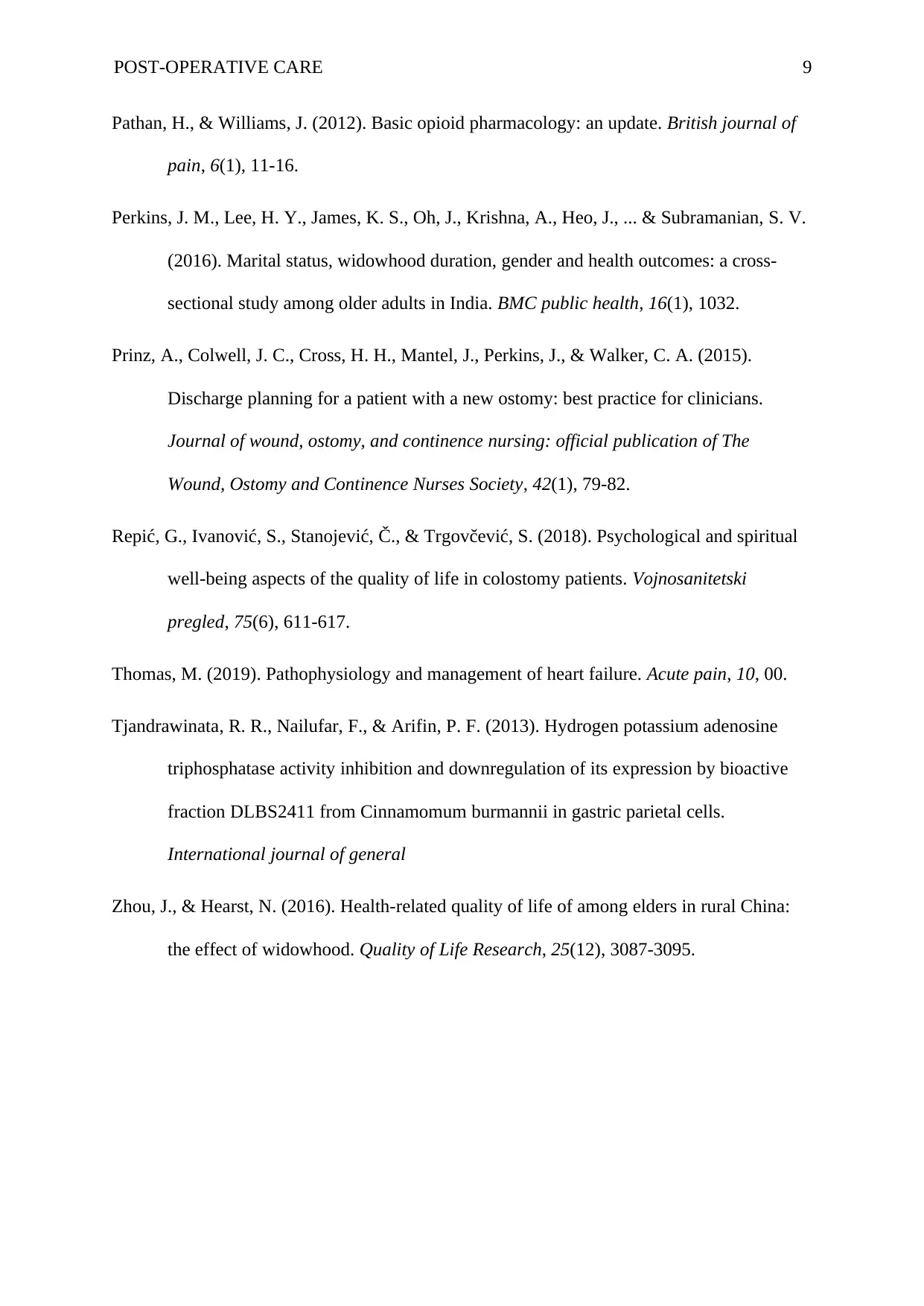
POST-OPERATIVE CARE 9
Pathan, H., & Williams, J. (2012). Basic opioid pharmacology: an update. British journal of
pain, 6(1), 11-16.
Perkins, J. M., Lee, H. Y., James, K. S., Oh, J., Krishna, A., Heo, J., ... & Subramanian, S. V.
(2016). Marital status, widowhood duration, gender and health outcomes: a cross-
sectional study among older adults in India. BMC public health, 16(1), 1032.
Prinz, A., Colwell, J. C., Cross, H. H., Mantel, J., Perkins, J., & Walker, C. A. (2015).
Discharge planning for a patient with a new ostomy: best practice for clinicians.
Journal of wound, ostomy, and continence nursing: official publication of The
Wound, Ostomy and Continence Nurses Society, 42(1), 79-82.
Repić, G., Ivanović, S., Stanojević, Č., & Trgovčević, S. (2018). Psychological and spiritual
well-being aspects of the quality of life in colostomy patients. Vojnosanitetski
pregled, 75(6), 611-617.
Thomas, M. (2019). Pathophysiology and management of heart failure. Acute pain, 10, 00.
Tjandrawinata, R. R., Nailufar, F., & Arifin, P. F. (2013). Hydrogen potassium adenosine
triphosphatase activity inhibition and downregulation of its expression by bioactive
fraction DLBS2411 from Cinnamomum burmannii in gastric parietal cells.
International journal of general
Zhou, J., & Hearst, N. (2016). Health-related quality of life of among elders in rural China:
the effect of widowhood. Quality of Life Research, 25(12), 3087-3095.
Pathan, H., & Williams, J. (2012). Basic opioid pharmacology: an update. British journal of
pain, 6(1), 11-16.
Perkins, J. M., Lee, H. Y., James, K. S., Oh, J., Krishna, A., Heo, J., ... & Subramanian, S. V.
(2016). Marital status, widowhood duration, gender and health outcomes: a cross-
sectional study among older adults in India. BMC public health, 16(1), 1032.
Prinz, A., Colwell, J. C., Cross, H. H., Mantel, J., Perkins, J., & Walker, C. A. (2015).
Discharge planning for a patient with a new ostomy: best practice for clinicians.
Journal of wound, ostomy, and continence nursing: official publication of The
Wound, Ostomy and Continence Nurses Society, 42(1), 79-82.
Repić, G., Ivanović, S., Stanojević, Č., & Trgovčević, S. (2018). Psychological and spiritual
well-being aspects of the quality of life in colostomy patients. Vojnosanitetski
pregled, 75(6), 611-617.
Thomas, M. (2019). Pathophysiology and management of heart failure. Acute pain, 10, 00.
Tjandrawinata, R. R., Nailufar, F., & Arifin, P. F. (2013). Hydrogen potassium adenosine
triphosphatase activity inhibition and downregulation of its expression by bioactive
fraction DLBS2411 from Cinnamomum burmannii in gastric parietal cells.
International journal of general
Zhou, J., & Hearst, N. (2016). Health-related quality of life of among elders in rural China:
the effect of widowhood. Quality of Life Research, 25(12), 3087-3095.
⊘ This is a preview!⊘
Do you want full access?
Subscribe today to unlock all pages.

Trusted by 1+ million students worldwide
1 out of 9
Related Documents
Your All-in-One AI-Powered Toolkit for Academic Success.
+13062052269
info@desklib.com
Available 24*7 on WhatsApp / Email
![[object Object]](/_next/static/media/star-bottom.7253800d.svg)
Unlock your academic potential
Copyright © 2020–2026 A2Z Services. All Rights Reserved. Developed and managed by ZUCOL.





